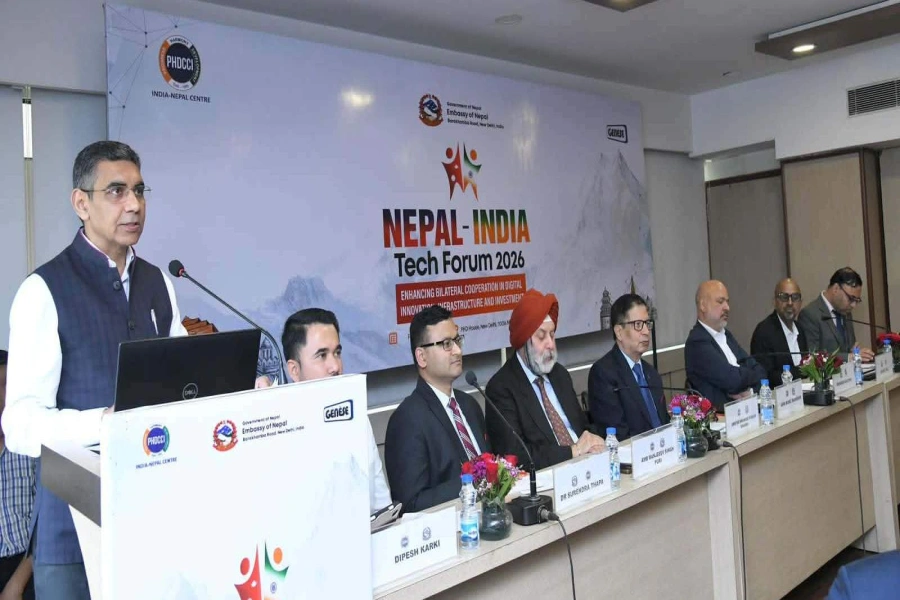MoLESS claims govt making efforts towards expediting ratification process
KATHMANDU, March 13: Despite the government's ban, Nepali women continue to engage in illegal domestic work abroad, resorting to illicit processes and routes. This has exacerbated issues of sexual exploitation and human trafficking. Since 2073 BS, Nepal has prohibited sending women for domestic work abroad.
Nepal has been pointing out the need for ratifying International Labor Organization (ILO) Convention 189 to maintain the rights and dignity of domestic workers. In 2011, the ILO adopted the Domestic Workers Convention 'C189'. However, Nepal has not yet been able to ratify the convention.
Having been a member state of the ILO since 1966, various migrant women worker groups have been advocating the rights of domestic workers through different programs. Stakeholders demand urgent government action to safeguard the rights of domestic workers. Bijaya Rai Shrestha, executive director of Aprabasi Mahila Kamdar Samuha (AMKAS), said that ratifying Convention 189 would provide domestic workers with skill development and language training for foreign employment, ensuring comprehensive worker rights.
Govt urged to ratify ILO Convention 189 for welfare of domestic...

She said that domestic workers are facing challenges in foreign employment. “The data on victims suggests that domestic workers are particularly vulnerable," she stated. “There is a lack of security and basic human rights for them,” she added.
She said that addressing issues within one's own country may seem less challenging, but the plight of migrant women abroad poses a different dilemma. Without legal safeguards in place, these women face vulnerability. Ratification of the Convention would ensure their protection and elevate domestic work to a dignified profession. Additionally, the convention mandates fair wages and compensation for extra work, aiming to establish a structured and respectable environment for domestic workers.
Freedom of movement for domestic workers has been ensured in the convention. Similarly, the right to organize should be guaranteed, all kinds of services including protection from abuse, incitement, violence etc have been guaranteed. Shrestha said that the reason why Nepal has not been able to ratify the convention so far lies in its inability to introduce a law to organize domestic workers in its own country.
According to her, now all rich people employ domestic workers in their homes without ensuring their security. They are earning less than Rs 10,000 a month. They have not even been able to get the minimum salary of Rs 17,000 mandated by the government. The lack of enforcement mechanisms has hindered the implementation of laws, preventing the ratification of the convention.
She said that the government has not prioritized the approval process, resulting in hardships for domestic workers abroad. This Convention deems it unjust, discriminatory, and demeaning when domestic workers are treated as mere servants, helpers, or maids.
According to ILO data, one in every 25 individuals globally is a female domestic worker, often working in isolated environments with little oversight, making them vulnerable to exploitation and abuse. The Convention seeks to address these issues and combat forced labor, advocating proper working conditions, human rights, and social security for domestic workers. The ILO claims that some of them had to suffer abuse such as physical, verbal and sexual violence, lack of comfort, and conditions of not getting wages.
The Convention aims to eradicate these issues and combat forced labor. The ILO believes that ratifying the Convention is crucial for ensuring domestic workers have access to adequate working and housing conditions, as well as respect for their human rights, fundamental rights, and social security.
According to ILO data, there are 67 million domestic workers worldwide. AMKAS Executive Director Shrestha said that Nepal's ban on domestic workers has also increased gender discrimination. Women make up a large part of the global workforce. Nepal has not yet ratified the 'Domestic Workers Convention' implemented in 2011. Concerned agencies have been pressuring and lobbying for the ratification of the Convention for a long time.
According to Laxman Basnet, Secretary General of the South Asian Trade Union Council, the failure to ratify the Convention even in these years is the helplessness of the state. Raising a question about the state, he said, "The government is now solely focused on counting money and remittances from abroad."
Labor expert Dr Meena Poudel said that the state continues to perpetuate social disparities among domestic workers by not lifting the ban on foreign employment for women. She emphasized the need to ensure safety, dignity, and organization for domestic workers by ratifying such a crucial agreement. According to the spokesperson for the Ministry of Labor, Employment and Social Security (MoLESS), Rajeev Pokharel, the government is moving towards expediting the ratification process.





































